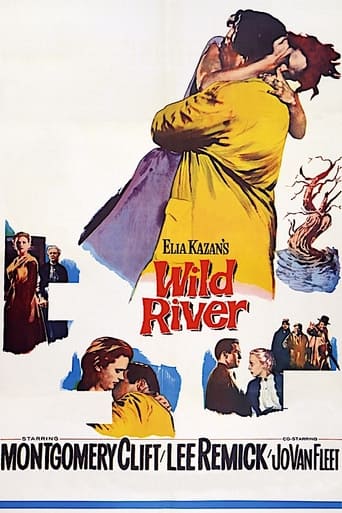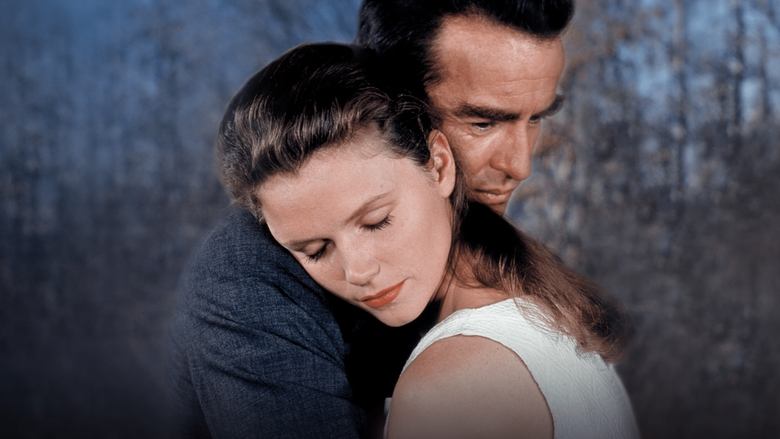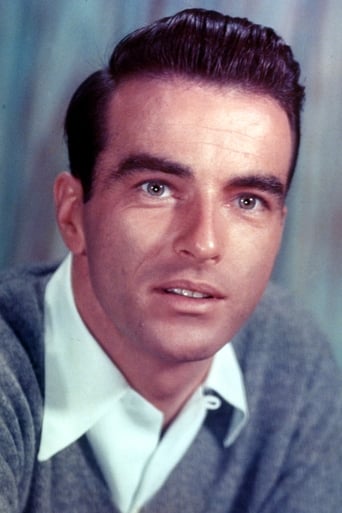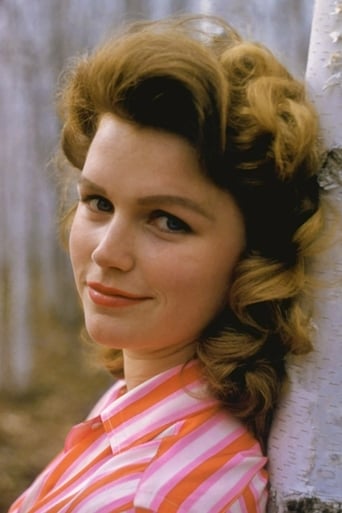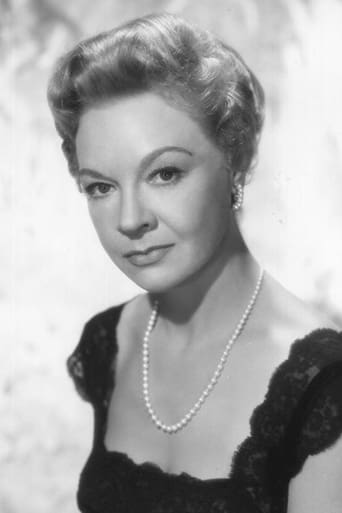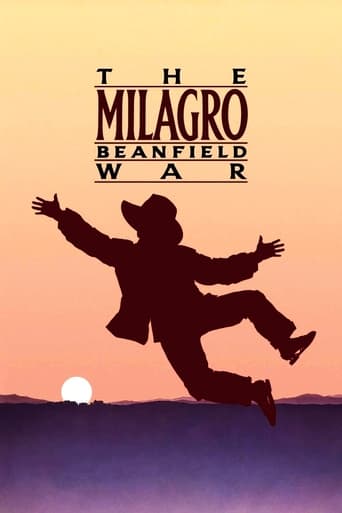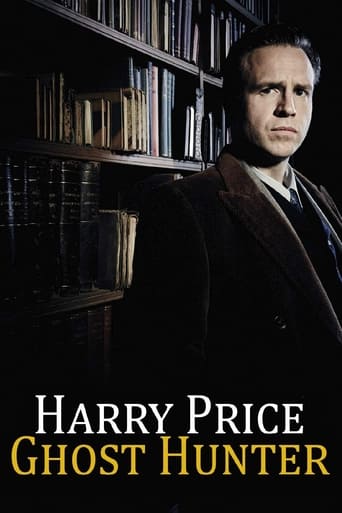Wild River (1960)
A young bureaucrat for the Tennessee Valley Authority goes to rural Tennessee to oversee the building of a dam. He encounters opposition from the local people, in particular a farmer who objects to his employment (with pay) of local black laborers. Much of the plot revolves around the eviction of a stubborn octogenarian from her home on an island in the river, and the young man's love affair with that woman's widowed granddaughter.
Watch Trailer
Free Trial Channels
Cast


Similar titles
Reviews
This is ultimately a movie about the very bad things that can happen when we don't address our unease, when we just try to brush it off, whether that's to fit in or to preserve our self-image.
Just intense enough to provide a much-needed diversion, just lightweight enough to make you forget about it soon after it’s over. It’s not exactly “good,” per se, but it does what it sets out to do in terms of putting us on edge, which makes it … successful?
The tone of this movie is interesting -- the stakes are both dramatic and high, but it's balanced with a lot of fun, tongue and cheek dialogue.
One of the film's great tricks is that, for a time, you think it will go down a rabbit hole of unrealistic glorification.
Lee Remick's own favorite among her movies, and fine late Elia Kazan, this historic romance of the TVA and progress vs. tradition is beautifully crafted, gorgeous to look at, exquisitely acted, and quite frightening in its depiction of potential mob violence. Cleverly adapted from two books by Paul Osborn, it takes its time spinning out a gripping tale of a government agent (a restrained Montgomery Clift, his private life a wreck, but none of it shows on screen) trying to evict a stubborn, proud old woman (Jo Van Fleet, magnificent; Shirley Jones won over this? Really?) from her island so it can be flooded and power brought to all those poor Tennesseeans. He enlists the aid of her widowed-mom granddaughter, Remick, and the relationship between her and Clift is wonderfully ambiguous and rich. It's intelligent, moving, and convincing, and nobody went to see it in 1960. Very worth seeking out.
This is a magnificent film, one of Elia Kazan's finest. Apparently it was his personal favourite Unfortunately, its one weak point is in the casting of Montgomery Clift. Because of this, the film does not equal Kazan's other masterpieces ON THE WATERFRONT (1954), BABY DOLL (1956), or SPLENDOUR IN THE GRASS (1961) in all of which the casting was perfect, or America America (1963, also known as THE ANATOLIAN SMILE), in which the passion of the young male lead Stathis Giallelis swept all before him in a wave of overwhelming emotion. (I must be one of the few people left who knew Stathis, as he never managed to carve a subsequent career for himself, despite all that Harold Loeb at the Warner Brothers New York office, whom I knew well at that time, did to help him. I never knew why Harold dropped out of films in 1970, having produced SOLDIER BLUE with Cappy Bergen. He died in 2003.) This features what was probably the finest performance given by Lee Remick in her remarkable career, although she had to struggle against the unresponsive Clift, with whom there was no chemistry whatever because he was not only gay but a confirmed masochist (whereas the part called for someone rather different, to say the least). In this film, Clift shows the emotional responsiveness of a rotting log. But Remick is glorious, transcendent in her performance, and she simply acts her way around him, ignoring the fact that he is asleep on the job. The other incredible performance in this film is by the elderly actress Jo van Fleet, in one of her finest roles. Both she and Remick delivered Oscar-level performances, and the direction was of that quality as well. The script by Paul Osborn was excellent despite the challenge of being derived from two separate novels by two different writers. Osborn had worked with Kazan before, having written the screenplay for EAST OF EDEN (1955), another 'impossible task' of adaptation. This film is a testament to the pioneer spirit which made America great. It is typified by the old matriarch Jo van Fleet, who refuses to leave the family property on an island in the Tennessee River despite a compulsory purchase by the federal government who have constructed a dam in the 1930s through the much-hated TVA (Tennessee Valley Authority). I remember Tennesseans ranting and foaming at the mouth about the TVA throughout the 1950s and into the 1960s. It was one of Roosevelt's biggest political power plays, whereby he broke down the rights of the states in favour of creating a dominant federal government which could override any local obstacle at will. This massive centralization of power in Washington used as its pretext the taming of the Tennessee River in order to prevent disastrous floods. But the locals knew what it was really all about. As one character says in this film, 98% of the population of the Tennessee River Valley were without electricity at that time. This was really about creating a situation where power companies could sell them electricity generated by hydroelectric power on their own land which had been seized from them with inadequate compensation, and it was also about the huge sums earned by out-of-state construction companies for constructing the dams, and paid by tax money taken from, amongst others, the inhabitants of Tennessee. In other words, it was about money, corruption, and power, and not about floods at all. In that respect it resembled the Civil War, which was not at all about slavery, as the slavery issue was falsely used as a cloak by the North to cover its commercial motives. (The slaves were all bought and traded by Northerners, who are the ones who made all the money from the disgusting slave trade. Georgia and South Carolina banned the slave trade as early as the 1830s, a quarter of a century before the Civil War. But this is all covered up in the history books of today, in favour of distorted propaganda which suits contemporary political motives.) This film was deeply unpopular with a certain class of Northerners, but welcomed in Tennessee and neighbouring states as something which at least approached a sympathetic treatment of their plight. Lee Remick looks very much like one of those gals, of whom I have seen so many, who lived in the wilds of Appalachia. This is ironic, since she came from Massachusetts. But she has the right haunted look, lean face, and intensely sensuous quality. She does moderately well with her accent, though there are few people in the film who really 'speak Tennessee'. The film is made on location, and is highly authentic, with the Hiawasee River standing in for the Tennessee River as it was before the dams were built. Most of the filming was in Bradley County. Kazan was no purveyor of Hollywood fantasies, he was always after the true grit. He may well have been America's greatest film director of all time. The fact that he was so violently hated by the victims of McCarthy should not be allowed to detract from a proper evaluation of his genius and compassion. One of the finest aspects of this film is its warmly sympathetic portrayal of the blacks (called 'Negroes' at that time), and especially the character Sam played by Robert Earl Jones. The amusing and devoted friendship between Jones and Jo van Fleet is portrayed with wonderful finesse and subtlety. Ellsworth Fredericks provides beautiful and lyrical cinematography, as he had earlier done for FRIENDLY PERSUASION (1956), greatly adding to the lustrous feel and texture of this tale set in the wilds of the South. The struggle between the forces of 'progress' and Jo van Fleet's desire not to leave the land that her family had lived on for several generations, with her granddaughter Lee Remick being caught in the middle, makes this a truly epic American saga.
According to Robert LaGuardia's biography of Montgomery Clift, director Elia Kazan got the germ of the idea for Wild River while working temporarily for the Department of Agriculture during the New Deal years. He saw how the creation of these government agencies changed American life and waited for about 20 years before finally getting to do his New Deal film.The agency he chose was one that has lasted and changed the lives of people in about seven states that the Tennessee River and tributaries flow through. The Tennessee Valley Authority was one of the great achievements of the Roosevelt administration bringing cheap hydroelectric power to a region that private companies would not service because it wasn't profitable. The dams on the tributary rivers and on the Tennessee itself became part of a whole system that changed everyone's lives in the region for the better.Well, almost everyone and that's what the story of Wild River is all about. A family named Garth headed by matriarch Jo Van Fleet lives and farms on an island in the river which will be flooded over when the dams are finished. TVA administrator Monty Clift is sent to deal with the situation, but also gets personally involved with Van Fleet's grand daughter Lee Remick.The film really belongs to Van Fleet. You'll not forget her portrayal of an aged and stern pioneer farm woman who is just fighting for the place that's been home all her life. In my opinion Kazan got just as good a performance out of Jo Van Fleet maybe even better than the one she got an Oscar for in East Of Eden. In fact the whole film is sadly overlooked when judging Elia Kazan's work. I think it's a masterpiece.As for Clift, Kazan originally wanted Marlon Brando, but when Brando proved unavailable he hired Clift who was becoming more available simply because of his unreliability due to his increased drinking. While he didn't stay clean and sober for the shoot, he respected Kazan and the film enough to be letter perfect on his days before the camera. Monty was on a sad downward spiral in his life though you would not know it from this film, the one preceding it Suddenly Last Summer and the one following it, Judgment At Nuremberg for which he got an Oscar nomination. He was one of the greatest screen actors there ever was, most of his work is classic. Ironically Marlon Brando would be hired when Clift died in 1966 for the starring role in Reflections Of A Golden Eye.Kazan has a real feel for the times in Wild River. It's not only good entertainment, but ought to be assigned viewing by political science professors who want to demonstrate the impact of the New Deal in American life during that period.And this review is dedicated to a man who worked for over 15 years to get the Tennessee Valley Authority through Congress. Senator George W. Norris was one of the giants of the US Senate, his is a career for the most part that ought to be studied and emulated. We could use a lot more like him today in government.
This nearly forgotten film from director Elia Kazan has a plot line closer to a Stanley Kramer film, albeit without the bombast. A government man, played by Montgomery Clift in his last great performance, tries to persuade the matriarch of a backwoods family to sell her land so a river can be routed through it. Clift's performance is matched by the always terrific Jo Van Fleet (only 40ish, but playing 80ish --- Kazan clearly indulges her). Van Fleet's performance is electrifying. Although there is a subplot involving Clift and Lee Remick, it takes a back seat to the Clift-Van Fleet showdown. Remick is terrific and Jay C. Flippin is a plus as one of Van Fleet's more intelligent "boys." A couple of drawbacks: the movie's widescreen and color photography soften its overall impact. There's no real sense that this is the 1930s. Nonetheless, WILD RIVER remains Kazan's nearly forgotten, near masterpiece.

